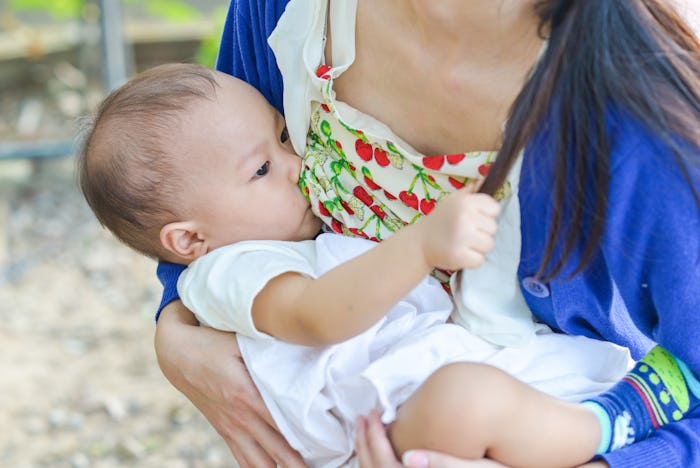Life

Can You Get A Flu Shot While Breastfeeding? Here's How To Stay Healthy
When flu season is gearing up, parents of nursing babies may have some specific concerns about keeping their kiddos safe. For instance, can you get a flu shot while breastfeeding, or is it a better idea to pass on the shot this year? There are many facts about flu season that breastfeeding moms should know, particularly in regard to keeping babies protected from this nasty virus.
If anything, breastfeeding a baby means you have even more reason to get the flu vaccine. "The vaccine is recommended for all pregnant and breastfeeding women to decrease both their own risk of developing influenza and also protect their infant," as Jeanne S. Sheffield M.D., Johns Hopkins Director of the Division of Maternal-Fetal Medicine and Professor of Gynecology and Obstetrics, tells Romper. "Infants cannot get the influenza vaccine until 6 months of age, so [they] rely on protection both from antibodies the mother passes to their child during the pregnancy and through the breast milk." In this way, breastfeeding helps keep your baby healthy.
But the breastfeeding parent isn't the only person who should get the flu shot this year. "Have all caregivers get the flu vaccine," advises Dr. Sheffield. This includes babysitters, grandparents, and anyone else who's frequently around the baby. This process of vaccinating everyone in the baby's life against the flu is known as cocooning, and it helps decrease the chances of your baby getting the influenza infection.
In addition, getting a flu shot yourself will not harm your baby in any way. "The vaccine used for pregnant and breastfeeding women is an inactivated virus vaccine so there are no risks of the infant developing the flu from the mother being vaccinated," says Dr. Sheffield. Even if you do experience some of the mild side effects associated with the flu vaccine, such as low-grade fever or muscle aches, these do not present any danger to the breastfed infant, explains Dr. Sheffield. The side effects will only affect you alone (which may not be great news, but at least the baby remains safe).
Once you and your household have flu shots, there are a few more ways to avoid passing the flu virus to your baby. Frequently washing your hands, as well as refraining from touching your eyes, nose, and mouth, are key ways to help prevent the spread of flu viruses, as explained in the Centers for Disease Control and Prevention (CDC). If a friend or loved one does come down with the flu, avoid being around that person until they are no longer contagious.
Lastly, pay close attention to your own health as well this flu season. "If you do develop flu symptoms, call your physician immediately as antiviral medications are available to shorten the infection and decrease complications," says Dr. Sheffield. You don't have to tough it out alone if you seem seriously sick at any point.
As always, definitely discuss any specific health concerns about flu season, flu shots, and breastfeeding safety with your pediatrician and family doctor. It's only natural to feel concern about your kid's health when such a nasty sickness is going around. For the most part, though, getting the flu shot is a smart, safe idea for any caregiver of young children.
This article was originally published on